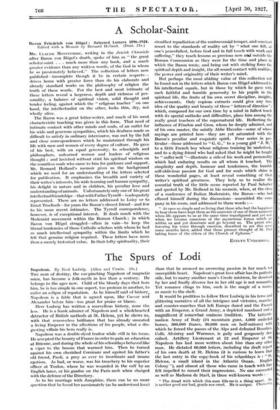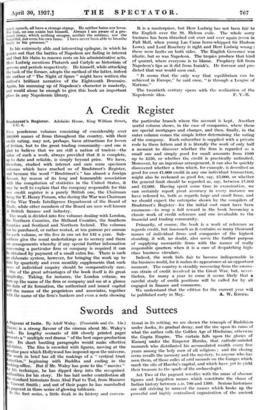The Spurs of Lodi
Napoleon. By Emil Ludwig. (Allen and Unwin. 21s.) THE man of destiny, the ear-pinching Napoleon of magnetic mien, has become a folk-myth in less than a century. He belongs to the ages now. Child of the bloody days that bore him, he is too simple in one aspect, too protean in another, to Miller an eclipse of reputation. As he himself said of history, Napoleon is a fable that is agreed upon, like Caesar and Alexander before him—too great for praise or blame.
Herr Ludwig has written a marvellous history, none the less. He is a frank admirer of Napoleon and a wholehearted detractor of British methods at St. Helena, yet he shows us, with that remorseless brilliance that has already unseated a living Emperor in the affections of his people, what a dis- gusting villain his hero really is.
Napoleon was a double-dyed traitor while still in his teens. He accepted the bounty of France in order to gain an education at Brienne, and during the whole of his schooldays behaved like a viper to the bosom that warmed him. Then he turned against his own cherished Corsicans and against his father's old friend, Paoli, a prey as ever to inordinate and insane egotism. As bad, or worse, was his treachery to his superior officer at Toulon, where he was wounded in the calf by an English lance, or his gunfire on the Paris mob when charged with the defence of the Directory.
As to his marriage with Josephine, there can be no more question that he loved her passionately (as he understood lovel than that he aroused no answering passion in her much too susceptible heart. Napoleon's great love affair has its pathetic side, but to marry another man's Creole mistress, be deceived by her and finally divorce her in her old age is not romantic. Yet romance clings to him, such is the magic of a name, as music to the shell.
It would be profitless to follow Herr Ludwig in his terse and glittering narrative of all the intrigues and victories, marcho and counter-marches that left Europe dazed and the French with an Emperor, a Grand Army, a depleted manhood and a magnificent if somewhat ominous tradition. The tatterde- malion Army of Italy (24 mountain guns, 4,000 underfed horses, 300,000 francs, 30,000 men on half-rations) with which he forced the passes of the Alps and defeated Beaulieu, Colli, Alvintzy and Wurmser, is gaily and gorgeously des- cribed. Artillery Lieutenant at 22 and Emperor at 34, Napoleon has had more written about him than any other man. He dictated 60,000 letters, including the draft report of his own death at St. Helena (it is curious to learn that the last entry in the copy-book of his schooldays is : " St- Helena, a small island in the Atlantic Ocean. English Colony "), and almost all those who came in touch with hinl felt impelled to record their impressions. No one succeeded so well as Madame de Steel, in these well-known words :-- " The dread with which this man fills me is a thing apart. 118 is neither good nor bad, gentle nor cruel. He is unique. Character. mind, speech, all have a strange stamp. He neither hates nor loves. For him, no one exists but himself. Always I am aware of a pro- found irony, which nothing escapes, neither the sublime, nor the beautiful, nor even his own fame. I have never been able to breathe freely in his presence."
In his extremely able and interesting epilogue, in which he points out that the battles of Napoleon are fading in interest and that his Claim to renown rests on his administrative acts, Herr Ludwig mentions Plutarch and Carlyle as histarian,s of persons and periods respectively. He him:self, while attacking the task of the former, adopts the method of the latter, indeed the author of" The Night of Spurs" might have writtea;the author's brilliant narrative of the Eighteenth Brumaire. again, his summing up of Napoleon's character is masterly, and would alone be enough to give this book an important place in any Napoleonic library. It is a masterpiece, but Herr Ludwig has not been fair to the English over the St. Helena exile. The whole sorry business has been thrashed out over and over again (even in Pall Mall, when young Las Cases horse-whipped Sir Hudson Lowe), and Lord Rosebery is right and Herr Ludwig wrong : there were faults on both sides. The English Governor was idiotic, but so was Napoleon. The tropics produce that kind of quarrel, where everyone is to blame. Prophecy fell from Napoleon's lips as it did from Isaiah's. He foresaw and pre- dicted that war would soon end.
"It seems that the only way that equilibrium can be achieved in Europe," he said once, "is through a League of Nations."
The twentieth century opens with the realization of the











































 Previous page
Previous page